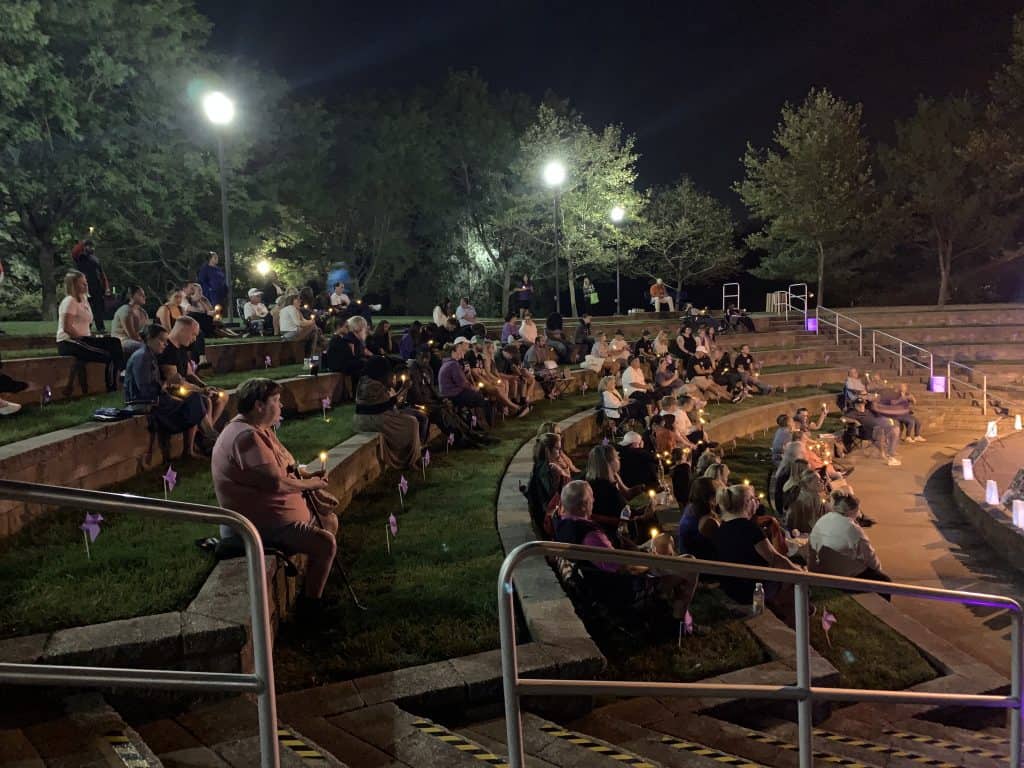
Burlington County held its annual Night of Tribute and Support Vigil on International Overdose Awareness Day, Aug. 31, an event designed to help eliminate stigma surrounding substance use disorder.
County officials, advocates, residents and families came together for a night of remembrance and support at the county’s amphitheater to remember those who lost their lives to the disease and provide support to loved ones left behind.
“The stigma of substance abuse disorder is dwindling, and we are all educating ourselves and the public to know and understand that there is much we can do to help our friends and family to get on the road to recovery,” said LaChia Bradshaw, county prosecutor.
“As the saying goes in Burlington County, ‘Stigma free is what we aspire to be’ …” she added. “If you or a loved one is struggling with substance abuse in Burlington County, you can get help right now. There is help and resources for people who are struggling with addiction.”
The vigil and remembrance ceremony was organized by the county’s Coalition for Healthy Communities; the Burlington County Department of Human Services; the county prosecutor’s office; and the supporting group Shouting4Shelby.
The evening included a wreath dedication, guest speakers, music, memorial presentations and a candle ceremony. The county’s Hope One Mobile Outreach Unit was also present at the amphitheater, along with information tables from more than a dozen support groups and providers, including Prevention Plus of Burlington County, Aspire Youth Development, Contact of Burlington County and the Center for Family Services.
“I think the word is getting out that this is a supportive and safe place for families to come and they can be together, and they can grieve and yet also know that there is support around them,” noted Libby Majewski, executive director of Prevention Plus.
The mobile unit is run by the Burlington County Sheriff’s Office, in partnership with the Burlington County Department of Human Services and its health department. Virtua Health, Maryville and the Deborah Heart and Lung Center also contribute staff to the unit, which travels to communities in the county to help link residents with recovery specialists and treatment facilities.
The unit also trains people on how to administer overdose antidotes. Its creation is among several actions the county has taken to assist residents suffering from substance use disorders and their families and loved ones. Last year, the county commissioners passed a resolution declaring all of Burlington County to be stigma free, as part of a campaign to help dispel misconceptions about substance use disorder and other mental illnesses.
By eliminating stigma, the commissioners hope to raise awareness and encourage more residents to seek the help needed to overcome their conditions.
“This is just a really wonderful event for the families and also for all of us who work with the families, and it has developed really wonderful relationships for us with the families … ” said Shirla Simpson, the county’s human services director. “This has been a way that we’ve all been able to establish relationships over the years also, planning this event, getting to know families and getting to know the loved ones that they’ve lost.”
Majewski and Simpson described the vigil as emotional and powerful, and shared their sentiments on what it brings to the community.
“I think it’s an important step for loved ones, friends and family who’ve lost someone to take that step to come out to an event like tonight, so that you’re supported as well, and you are surrounding yourself with people who understand and have a shared experience and that they also are honoring their loved one,” Majewski observed.
“Also, I think it’s really important for continuing to address stigma and to reduce stigma, and it’s important for parents and families to show up.”
“You’ll see everybody hugging …” Simpson described. “Every year, you see the same people gathering, and when new families arrive, that’s what happens for them, is that they feel it right away. They’re brought into this community. They feel that they’re a part of something, and that they’re going to be taken in and cared for.
“If families take part in these events,” she added, “they’ll get the support that they need, and the care and the services that they need to get through it.”









